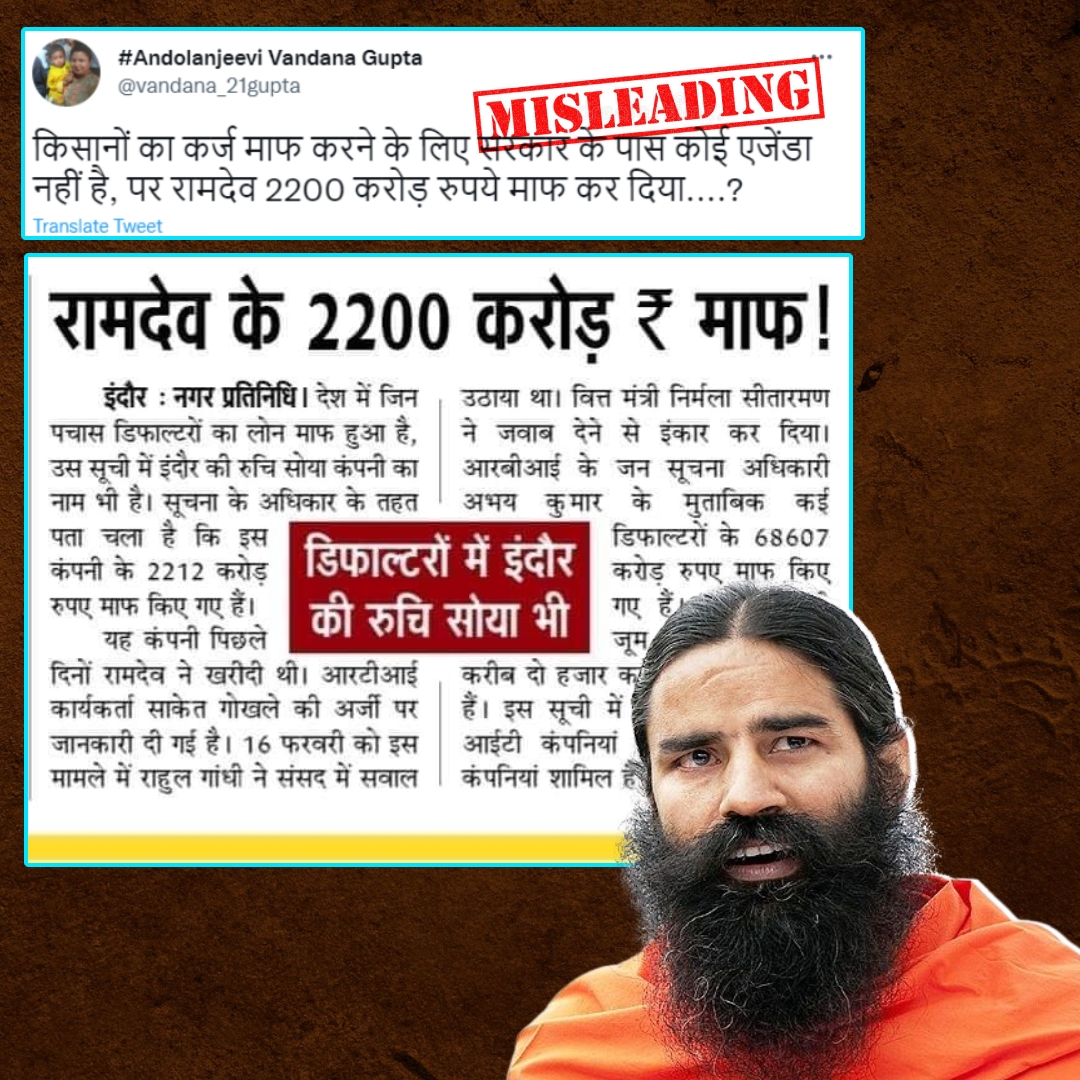
Image Credit: Twitter, Wikibio/Baba Ramdev
Did Centre Waive Off Baba Ramdev's Loans Worth Rs 2,212 Crore? No, Viral Claim Is Misleading
Writer: Jakir Hassan
A journalist at heart loves the in-depth work of reporting, writing, editing, research, and data analysis. A digital and social media enthusiast.
India, 9 Aug 2022 11:39 AM GMT
Editor : Bharat Nayak |
As the founding editor, Bharat had been heading the newsroom during the formation years of the organization and worked towards editorial policies, conceptualizing and designing campaign strategies and collaborations. He believes that through the use of digital media, one could engage the millennial's in rational conversations about pertinent social issues, provoking them to think and bring a behavioral change accordingly.
Creatives : Jakir Hassan
A journalist at heart loves the in-depth work of reporting, writing, editing, research, and data analysis. A digital and social media enthusiast.
A claim is circulating across social media alleging that a loan of Rs 2,212 crore to Ruchi Soya, a company owned by Ramdev, has been waived off by the government. The Logical Indian Fact Check verifies the claim.
A claim is circulating across social media alleging that a loan of Rs 2,212 crore to Ruchi Soya has been waived off by the government. The claim is connected with Indian Yoga Guru Ramdev and his ayurvedic products company Patanjali.
Claim:
The viral image is a snapshot of what appears to be a news article. The article's headline reads, "Ramdev's Rs 2,220 crores waived". The article reads, "In the country, Ruchi Soya is one company out of the fifty defaulters whose loans have been waived. As per a notification, Rs 2212 crores of the company have been waived off."
This company was bought out by Baba Ramdev. The article mentions that the information was received through an RTI appeal by RTI activist Saket Gokhale. The article also mentions that RBI official Abhay Kumar notified that a sum of Rs 68607 crore had been waived off.
The post is viral across Facebook and Twitter.
Fact Check:
The Logical Indian fact check team verified the viral claim and found it to be misleading. Patanjali Ayurved acquired Ruchi Soya for Rs 4,350 crore in December, 2019.
We conducted a keyword search across social media with relevant keywords and came across posts with the viral image published on April 29, 2020, and another post on a Facebook page, 'BSP on Social Media'.
Following this, we conducted a keyword search for the RTI reply mentioned in the viral image by Saket Gokhale regarding wilful defaulters in India. We came across this tweet by Gokhale, who is the National Spokesperson for the All India Trinamool Congress.
To clarify the difference between a write-off and a waiver, we conducted a keyword search for the Reserve Bank of India's directive on these terms. We came across a note issued by the RBI on this issue published on February 9, 2016. The note says that writing off is a general practice implemented by banks to clean up their balance sheets. "It is primarily intended to clean up the balance sheet and achieve taxation efficiency." the note states.
To properly illustrate the difference, we came across this Bajaj Finserv article. In the case of write-offs, the lending banks clean up the bad loans from their balance sheet. However, the banks continue to recover the loan amount later. Moreover, if any collateral is attached to the loan, then the lender acquires and sells it to recover the amount. This practice is conducted when banks deem that recovery of the loan amount is difficult.
However, in the case of loan waive-off, the lender completely cancels the amount which is owed, which means that the borrower is free from the debt. If any collateral is with the loan, then it would be returned to the borrower. An example of this is the government offering a loan waive-off facility to farmers during natural disasters.
In the case of Ruchi Soya, the company entered into the Corporate Insolvency Resolution Process after it was declared a wilful defaulter by its lender IDBI Bank. The company had a debt of Rs 12,000 crores. After insolvency proceedings, Patanjali Ayurved proceeded to acquire Ruchi Soya for Rs 4,350 crore in December 2019.
As per this Mint article, Patanjali reportedly settled Ruchi Soya's dues worth Rs 4,350 crore towards its lenders by infusing Rs 1,100 crore equity and paying another Rs 3,250 crore through debt.
An NDTV article published on April 9, 2022, states that Ruchi Soya has become a completely debt-free company. The company repaid Rs 2,925 crore loans to banks and has become a debt-free company after recently raising Rs 4,300 crore through its follow-on public offer.
In our Fact Check, we also came across an article published by BBC Hindi on 29 April 2020, which contained a tweet by lawyer Prashant Bhushan. In the tweet published on the same date, Bhushan clarified that he had previously tweeted a poster in which Ramdev was mentioned as a defaulter whose loan was waived off by the Centre.
He noted that this poster was based on a news article in which Ruchi Soya was said to be a defaulter, where his name was also added. Bhushan says that later, he learned that Baba Ramdev was trying to buy the company.
Conclusion:
In our Fact Check, we found that Ruchi Soya was going through insolvency proceedings in December 2017. As a part of these proceedings, the company's debt of Rs 2,212 crores was written off. A write-off means that the lending banks clean up the bad loans from their balance sheet. However, the loan continues with the lending bank, and they can try to recover it later. Then, in December 2019, Patanjali Ayurved proceeded to acquire Ruchi Soya for Rs 4,350 crore.
As per recent reports, the company repaid Rs 2,925 crore loans to banks and has become a debt-free company. We can ascertain that Ruchi Soya's debt had been written off before its acquisition by Patanjali Ayurved. Thus, the claim is misleading.
If you have any news that you believe needs to be fact-checked, please email us at factcheck@thelogicalindian.com or WhatsApp at 6364000343.
Also Read: This Video Doesn't Show Army Man Being Killed During Clash Between Kanwariyas
 All section
All section














